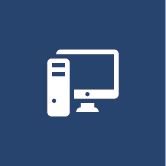COMPUTER LAB
The computer lab, recognized as the best in its category by the Nepalese Education Ministry, was built next to the Mt Kailash School in Hyangja. The lab is a pleasant, inviting place cared by the students. Two wall paintings by a local artist represent the values of the project: knowledge, permanent learning, wisdom, friendship and how each friend is responsible for leading the other into virtue. Each computer is assigned yearly to two students who work in tandem according to the eightfold golden rules (see below). Thanks to the involvement of IT specialists from Europe and Nepal, as well as the local community, the computer lab started operating in 2005. At the beginning frequent Maoist strikes and recurring problems with the power supply made the operation of the lab challenging.
Timeline

Launch of e-Malaya project
March 2003 – February 2004
Planning and fundraising in Nepal and Europe. Main sponsors are NGOs, foundations and IT companies from Germany and Andorra.
See first sustainability agreementsSee second sustainability agreements

Building of computer lab
May 2004 – October 2004
The 100 m2 computer lab was completed as planned within six months, despite the monsoon, the challenging political situation and frequent power cuts.

Computer set up
December 2004 – April 2005
20 computers were assembled locally with the support of Carsten Prox, IT engineer, and Tashi Phuntsok, project manager.

Teacher Training
December 2004 – April 2005
The eight teachers of the Mt Kailash School received computer training and were encouraged to use computers in their respective classes.

First computer class
Since 2005
Tashi Phuntsok, science teacher, starts as a computer teacher in addition to his function as project manager.
Your Eightfold Golden Rules
The Computer is your precious friend
If we look around us, even in Nepal computers have become more and more part of our daily life. For example, in Tashi Palkhiel, computers help our settlement office to manage accountancy,
to write letters and reports, to send e-mails, etc. Computers have become precious working tools in many fields. So learning about computers is gaining a precious knowledge for your future life!
Operate it with care
Be gentle with your keyboard, monitor and CPU. They all are sensitive devices. Don’t forget to put on the dust covers after using them at the end of your class.
Monitor and report
Be aware of messages, warnings and problems when using your computer and report every detail to your teacher in order to keep the lab running.
Protect your lab against viruses
Never use any floppy disks or USB sticks from untrusted sources, like internet cyber. Only use programs authorized by your teacher in order to avoid any viruses.
Use but save electricity
When class begins, switch on the PCs one after another and not at the same time: first the monitor, then the CPU. Before you leave, don’t forget to switch off your monitor. Be aware of UPS warnings:
if you hear quick beeping, hibernate your PC immediately.
Try and be curious
Always be curious and try out, this is the best way to become a computer expert. Feel free trying new applications/softwares without any risk of damage to the PC.
Enjoy learning computer
Learning together with your classmate is more effective as it develops your team spirit. Learn more by motivating your teachers to use computers in their subjects.
Respect your environment
Don’t eat or drink close to your computer: liquid or dirt can destroy the hardware. The hard disk of your PC is most precious: always shut down or hibernate before switching off your CPU in order not to damage it.
